Everthing you should know about vegan protein
You know the dilemma: No sooner do you tell Uncle Werner or Grandma Ingrid that you’ve gone vegan, they ask if you’re already suffering from protein deficiency. Well, here’s good news for friends and family: There’s protein in just about all plant-based foods. But that’s not all – not by a longshot. In this article we will explain why proteins are important and what you need to pay attention to in a vegan diet. In this way, we will try and give you (and your worried loved ones) answers to the great vegan-and-protein mystery.
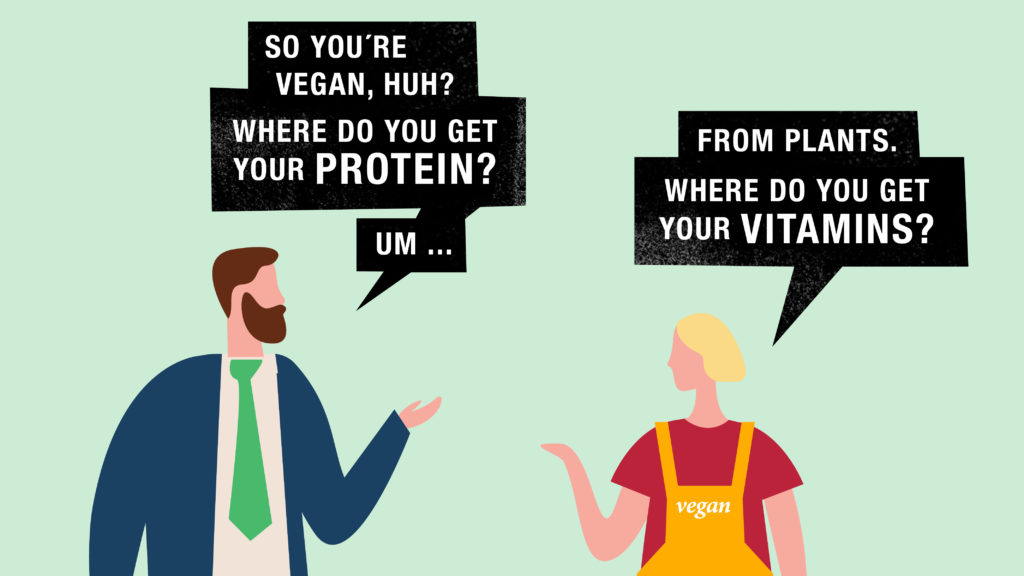
Just a little information in advance: Please keep in mind that we are not nutritionists, which is why we’ve taken a few notes out of the wonderful book “Vegan Klischees Ade!” by Niko Rittenau and – in our opinion – summarised the most important facts. If you want to delve even deeper into the subject of “plant-based proteins”, this book source is just the right one for you!
Okay, so that you can really impress Uncle Werner and Grandma Ingrid with your protein knowledge, lets start with the basics: Proteins are a major component of each human cell. Your body makes up proteins from nearly 20 different amino acids.
- Essential Amino Acids: The body is unable to produce 8 amino acids itself, i.e. they must be supplied via food.
- Semi-Essential Amino Acids: The body is able to produce 2 amino acids itself, but in some situations not enough. Histidine, for example, is not essential for adults, but for babies it is.
- Non-Essential Amino Acids: The body is able to produce 10 non-essential amino acids itself.
Aha! That means that the protein itself isn’t what’s important for your body, but the taking in of certain amino acids through yummy foodstuffs.
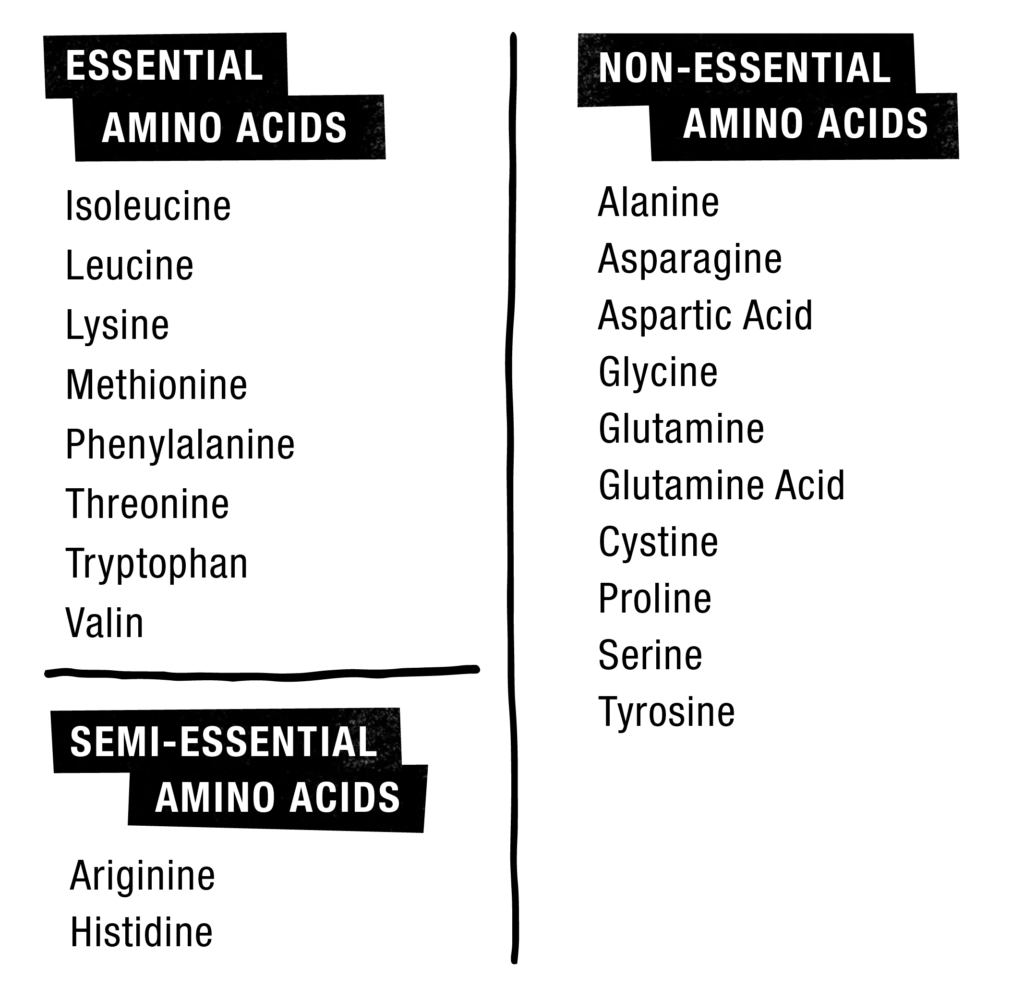
Proteins fulfil a great number of necessary bodily functions: Among other things, molecular proteins ensure the maintenance of body structures and are central building blocks for muscle, nerve and connective tissue. Transport proteins are responsible for the transferral of oxygen into the blood and the so-called immune proteins are important in the fight against pathogens. As you can see, it is therefore extremely important to integrate proteins into your daily routine and everyday life and see them as part of a balanced diet.
According to the DGE, you need 0.8 grams of protein per kilo of your body weight daily
Source: Niko Rittenau, p.27
Are you completely vegan? Some publications recommend a “protein safety buffer”, i.e. between 0.8g and 1g per kilo of your body weight. However, there is currently no consensus on whether vegans should actually consume more protein.
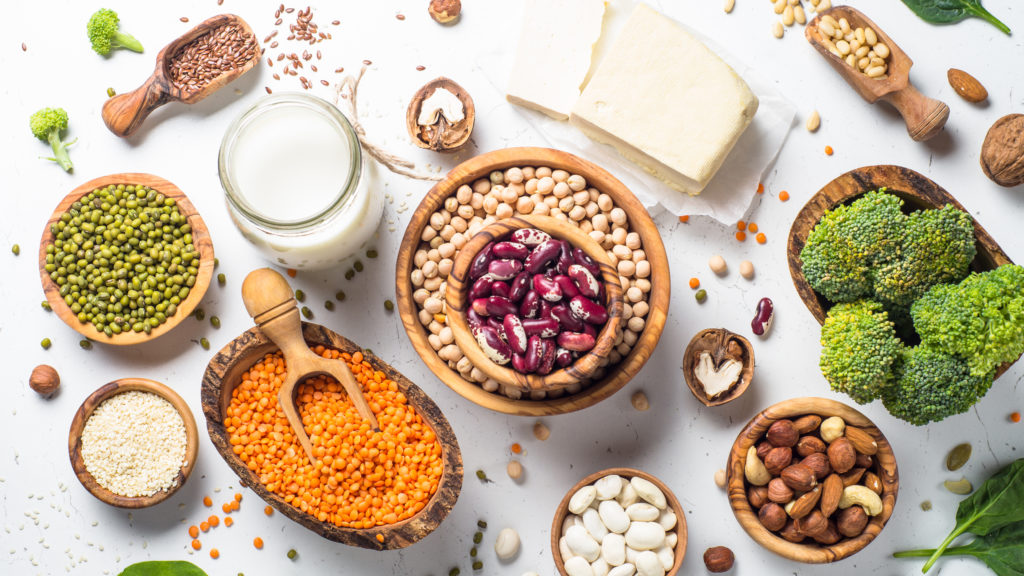
Grandma Ingrid asks: Where do you get enough protein from?
Soy instead of steak, hemp instead of chicken – is that even possible? Of course it is! You don’t need animal protein to meet your daily requirement. As you can see from the image below, pumpkin seeds, hemp seeds and peanuts are the top 3 suppliers of protein. But that doesn’t mean you should only snack on pumpkin seeds. After all, nuts and seeds contain higher amounts of fat and therefore more calories. Enjoy them more as a supplement to pulses and whole grains – which are, relatively speaking, better sources of protein. Sure, they offer less protein, but they also have a lower fat content and therefore fewer calories. Therefore, if you follow this little rule, you won’t have to worry about your daily protein requirements.
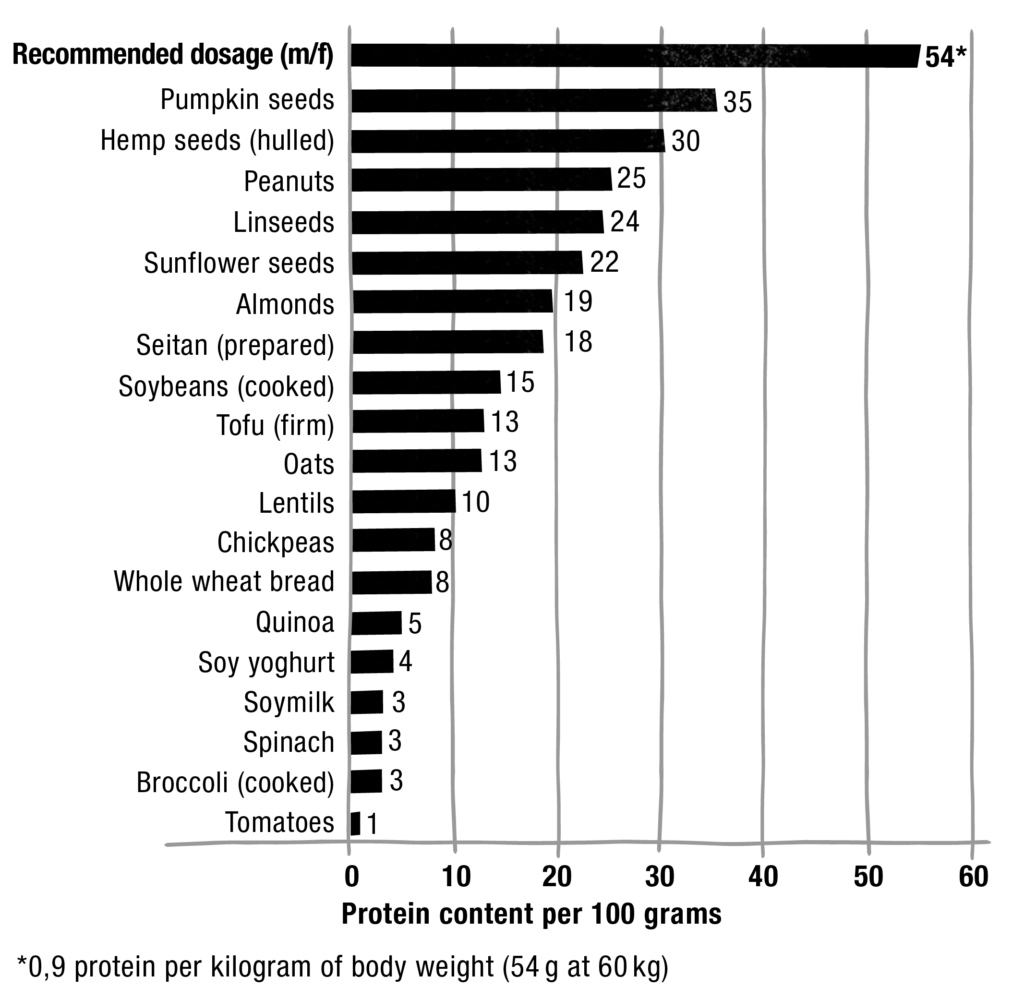
Don’t forget: Proteins or not – eat your veggies! Although they contain little protein, you should always get plenty of fruit and vegetables since they supply us with lots of vitamins and secondary plant compounds. We all know that a balanced diet is essential.
plant-based protein from veganz
Proteins are supposed to deliver performance? Yes! Protein should taste good? Oh, yeah! How convenient that these things can be easily combined with the protein products from Veganz. Our protein bars and protein drinks look super good, are in top form and are full of first-class ingredients.
Biological Value and Digestibility of Proteins
In addition to the protein content of food, there are two other factors that are important for the supply of protein in humans, namely the amino acid composition, or biological value, and the digestibility of a protein. Huh? Let us explain.
BIOLOGICAL VALUE
“Yeah, yeah,” Uncle Werner would say. “But animal proteins are much higher in quality than plant proteins.” And yes, if considered separately, animal proteins have a higher biological value than plant proteins. But before we return to Uncle Werner, let us first explain what the term means.
The biological value evaluates how effectively the body uses a food protein.
Source: Niko Rittenau, p.39
The reason: As you learned above, your body makes up proteins from 20 amino acids. Of these, 8 should be taken in through your diet. The best way for your body to utilise a food protein is if it has a high essential amino acids content that best meets your needs.
You will find all the essential amino acids in complete foods. But not always in the right ratio or often in different quantities.
Source: Niko Rittenau, p.40

Using wheat protein as an example, we’ve illustrated this for you once. If you ate only pasta and other grains, 4 amino acids would not be available in the optimal amount (in red). Rittenau says: “If proteins are predominantly obtained from one source and this source does not contain the essential amino acids in a sufficient ratio to human requirements, theoretically it can lead to a deficiency.”
But that shouldn’t scare you off – after all, you have the opportunity to integrate and combine a few different protein suppliers in your breakfast, lunch and dinner. This way, you can easily balance amino acids and increase their biological value. And, according to the American Heart Association, this is very easy:
You don’t have to worry about the protein combination within a meal as long as you eat whole grains, legumes, nuts and seeds ervery day.
Source: Niko Rittenau, p.42
However, in case you (or Uncle Werner) want to know for sure: Take a look at the chart below. Here you can see which amino acids are richer or less rich in which foods and how you can improve the amino acid profile by combining them.

Source: ECODEMY.DE
DIGESTIBILITY
Beans, beans, the magical fruit, the more you eat, the more you toot? That depends! It’s true that most of the time animal proteins are more digestible than vegetable ones – which is often due to the fact that vegetable proteins contain more fibre, or if you eat them in their “raw state”. However, what are mixers, pots, pans and your pearly whites for? According to Niko Rittenau, the digestibility of vegetable proteins can be improved by cooking, mixing and thorough chewing.
Grandma Ingrid asks: Are plant-based proteins really better for you than animal ones?
According to a study by the Harvard Medical School, the answer to this question can only be “yes and no”. The study found that the substitution of vegan protein for animal protein can be associated with a lower mortality rate. However, the researchers assume that it is not only plant proteins that provide the positive effects, but vegan food as a whole. Let’s talk numbers:
OF THE 3 % CALORIES PARTICIPANTS CONSUMED MORE IN THE FORM OF VEGETABLE PROTEINS, THE MORTALITY RISK DECREASED BY 10 % DURING THE STUDY PERIOD.
In particular, the risk of cardiovascular disease increased in people who had consumed more animal protein.
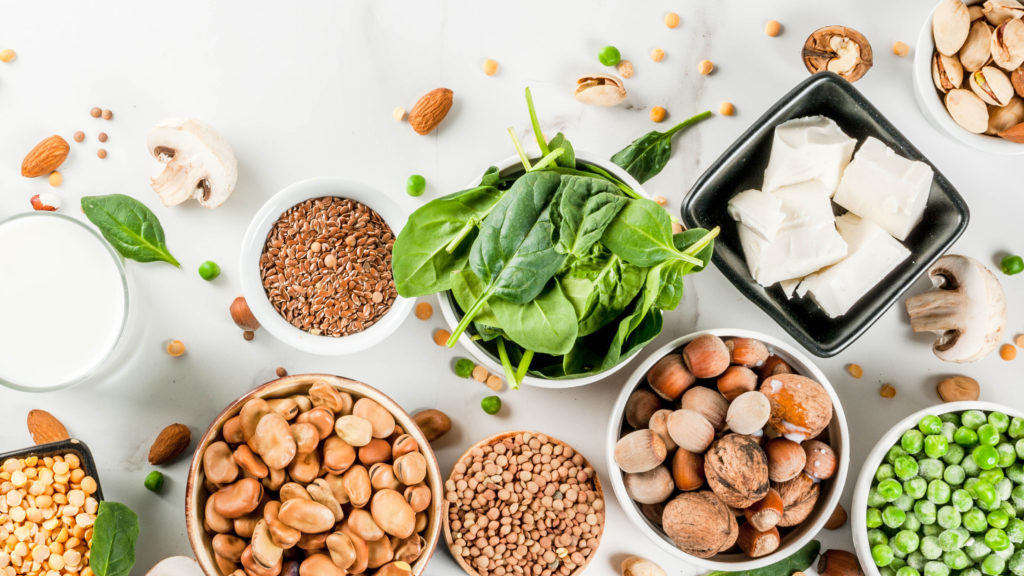
Let’s just say that if you ate only salad, probably. But don’t worry – that doesn’t go for legumes, potatoes or other plant-based protein sources. According to a study of the University of Massachussetts, it doesn’t matter to your body whether you resort to animal or vegetable proteins to build up more muscle power and muscle mass. The only thing that’s important is that you consume enough protein, regardless of whether in meat, milk or vegetables.
What might be important, which is generally the case with muscle building, is that you increase your protein intake. So, don’t calculate 0,8 g to 1g protein per body weight daily, but orientate yourself on the values of this table. Again, a “protein buffer” for vegans was used.

How does the saying go? “Knowledge is Power”. You probably know a bit more about plant-based proteins after reading this blog post, not a lot can go wrong when the usual discussions on veganism come up at family celebrations – now you have a good basis for argumentation. However, knowledge is just one side of the story. We should all do a little bit of implementing, of course. In the end, we have shown how elementary proteins react to your body and what functions they have for it. We’ve also informed you that you can easily cover your daily protein requirements with plant-based foods.
Protein deficiency? Not you! You should now be a champion in eating a balanced diet, knowing that by combining certain foods, you’ll increase your amino acid profile.
You can now recite the rule of thumb in your sleep: Eat a few pulses, seeds, nuts and whole grains every day and a possible deficiency can’t stand a chance!
In addition, you can now explain the connection between plant-based proteins and foods and the effects on health.
Last but not least, your loved ones will sleep better at night when you tell them why your muscles won’t start disappearing into thin air. Well, what are you waiting for? Make sure you get enough protein, grab Grandma Ingrid and Uncle Werner and get ready for a wild discussion!
sources
Ecodemy (2019): https://ecodemy.de/magazin/wp-content/uploads/sites/2/2019/11/ecodemy-infografik-pflanzliche-proteinkombinationen-HQ.jpg [10.08.2022].
Dammann, Marieke / Helena Jacoby (2019): Das sind sie: Die 10 besten veganen Eiweißquellen, in: EatSmarter, [online] https://eatsmarter.de/ernaehrung/das-sind-sie-die-10-besten-veganen-eiweissquellen [03.08.2020].
DER SPIEGEL (2016): A-26d0b817-0001-0001-0000-000001105632, in: DER SPIEGEL, Hamburg, Germany, [online] https://www.spiegel.de/gesundheit/ernaehrung/pflanzliches-eiweiss-ist-gesuender-als-tierisches-a-1105632.html [04.08.2020].
Eiweiß | Proteinmangel mit vegan-vegetarischen Lebensmitteln vorbeugen (2020): in: ProVeg Deutschland, https://proveg.com/de/ernaehrung/naehrstoffe/eiweiss-proteinmangel-vegan-vorbeugen/ [04.08.2020].
Eiweiß – Lebensmittelverband Deutschland (o. J.): in: Lebensmittelverband.de, [online] https://www.lebensmittelverband.de/de/lebensmittel/inhaltsstoffe/eiweiss [03.08.2020].
Kahlert, Julia (o. J.): Was ist der Unterschied zwischen pflanzlichem und tierischem Protein?, in: Codechek, https://www.codecheck.info/news/Was-ist-der-Unterschied-zwischen-pflanzlichem-und-tierischem-Protein-252200 [04.08.2020].
Mangano, Kelsey M / Shivani Sahni / Douglas P Kiel / Katherine Tucker / Marian Hannan / Alyssa Dufour (2017): Dietary protein is associated with musculoskeletal health independently of dietary pattern: the Framingham Third Generation Study, in: Oxford academic, [online] https://academic.oup.com/ajcn/article/105/3/714/4569695?sid=187de680-e319-4d4d-8179-da6ab0835359%202.%20Juli%202020,%2015:52 [03.08.2020].
Rittenau, Niko (2018): Vegan-Klischee ade!, in: Niko Rittenau, [online] https://www.nikorittenau.com/vegan-klischee-ade/ [03.08.2020].
Song, Mingyang (2016): Association of Animal and Plant Protein Intake With All-Cause and Cause-Specific Mortality, in: Cardiology | JAMA Internal Medicine | JAMA Network, [online] https://jamanetwork.com/journals/jamainternalmedicine/fullarticle/2540540 [04.08.2020].